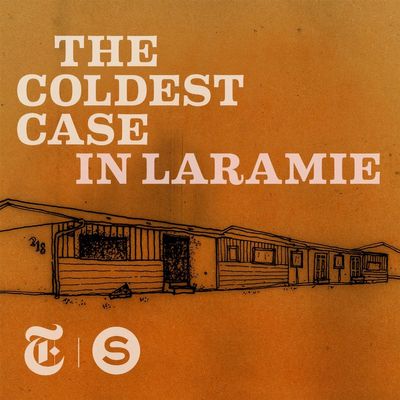
In Kim Barker’s memory, Laramie was a miserable place. “I’ve always remembered it as a mean town,” she recalls. “Uncommonly mean. A place of jagged edges and cold people.” Barker had spent some years as a teenager in the small Wyoming city of 30,000-ish people, unfortunately infamous today as the site of the Matthew Shepard lynching. Now a seasoned journalist with the New York Times, Barker even compares the place unfavorably to literal conflict zones she’s reported from in the past: Kabul, Islamabad. It’s common for people to hold morose views of where they grew up, but this is something else.
Barker is the host of The Coldest Case in Laramie, the new audio documentary series from Serial Productions, out in its entirety today. (It’s also the first Serial project hosted by a Times reporter since the studio was acquired by the organization.) Her vision of Laramie feels somewhat contiguous with the portrayal of the two other non-urban American locales featured elsewhere in Serial’s reportorial universe: the Woodstock, Alabama, of S-Town, all mystery and Southern Gothic, and the Bladen County, North Carolina, of The Improvement Association, mired in internecine electoral warfare. All three projects share some interest in unspooling Americana, but what distinguishes this newest release is a palpable sense of darkness. Laramie is easily Serial Productions’ grimmest creation, which is an exciting prospect given the studio’s public-radio heritage. But it also feels like it’s missing something.
The cold case in question took place almost four decades ago. In 1985, Shelli Wiley, a University of Wyoming student, was repeatedly stabbed and then dragged into her apartment, which was then set ablaze. Two separate arrests were eventually made for the crime, but neither stuck. And so, for a long time, the case was left to freeze. Years pass, lead detectives turn over, trauma congeals into lore.
Barker was a kid in Laramie at the time of the murder. The case had stayed with her since, so notable was its brutality. Decades later, while waylaid by the pandemic, she found herself Googling the murder — only to find a fresh development. In 2016, law enforcement arrested Fredrick Lamb, a former local police officer who had lived two doors down from Wiley, for the murder. There had apparently been blood and other circumstantial evidence linking him to the scene, which caused many in the area, including law enforcement, to believe he was the culprit all along. Lamb had even given something close to a confession during an interrogation. (The reason they returned to him as a suspect after so many years is complicated.) At any rate, it seemed to be a solved case.
Then, shortly thereafter, police officials inexplicably dropped the charges. None have been filed since. What, exactly, happened here? Enter Barker.
Let’s not call The Coldest Case in Laramie a true-crime story. It certainly doesn’t want to be. Even the show’s press materials explicitly distance itself from being “a case of whodunit.” It’s also not quite a wrongful conviction piece, an increasingly prominent (and somewhat better-regarded) variant within the genre, since Lamb was never incarcerated. Indeed, the podcast is perhaps best described as an extensive accounting of when the confusion around a horrific crime meets a gravitational pull for closure. In the absence of true information, all manner of things may rush to fill the void. Collateral damage is all but guaranteed. It’s a massive clusterfuck.
At the heart of The Coldest Case in Laramie is an interest in the unreliability of memory and the slipperiness of truth. One of the story’s more striking turns involves the roommate of the victim, who long held a memory of being sent a letter with a bunch of money and a warning to skip town shortly after the murder. The letter had been seared into her brain for decades, calcifying into a defining detail of how she recalls the traumatizing event — except, as revealed through Barker’s dogged investigation and archival spelunking, few things about that recollection are what they seem.
“We are all unreliable narrators, especially of our own stories,” Barker concludes laconically near the end of the series. The line echoes the thematic gambit that opens the very first episode of the very first season of Serial, delivered by Sarah Koenig: “It’s really hard to account for your time. In a detailed way, I mean. How’d you get to work last Wednesday, for instance? Drive? Walk? Bike? Was it raining? Are you sure?”
The Coldest Case in Laramie’s centerpiece arrives in the sixth episode: an extended recording of the interrogation that would ultimately lead to Lamb’s brief 2016 arrest. Barker and the team, which includes producer Alvin Melathe, make the remarkable choice of keeping you in the tape for an extraordinary length of time. The recording cuts across the interrogation’s several hours, showing how Robert Terry, the latest detective to pick up the cold case, ground Lamb down — so much so, that Lamb appears to accept the plausibility of being responsible for the murder but having no memory of it. What’s remarkable is how you seem to hear Lamb internalizing the DNA evidence linking him to the crime scene, almost as if he’s reconstructing himself around the data laid in front of him. Of course, the charges didn’t end up sticking, and listening back, one can quickly identify the interrogation as coercive. In a wild turn, the questioning ends with Lamb even praising the detective for his interrogative work, cop to cop. The detective seems to believe the praise to be earnest. Frankly, it’s hard not to think the same. But even that might not be the truth. When Barker interviews him more recently, Lamb claims that he was being sarcastic. We’re vaulted, then, back into the deep fog of subjectivity. What, exactly, did the recording of that interrogation reveal? Are you sure?
Everything presented in the podcast is incredibly compelling, but it also feels, oddly, somewhat commonplace. Given the pedigree of Serial Productions, one feels accustomed to expect something bigger — a grander scaffolding on which to hang this story. Even We Were Three, quietly released last October, carried a punch with a force extending far beyond its slight three-part construction: What started out as a tragic story about COVID and conspiratorial thinking swiftly transmogrified into a richer narrative about family, alcoholism, and reconstruction after grief.
This may well have less to do with The Coldest Case in Laramie than with nonfiction crime storytelling more generally. We’re currently so deep into a modern documentary boom — one utterly dominated by true crime and adjacent stories — that we’ve pretty much come out the other side. The storytelling mode is so pervasive today that even its more evolved iterations, which often explicitly spotlight the failures of the justice system and grapple with the subjectivity of truth, have coagulated their own predictable tropes. The few exceptions to the rule tend to remix the genre’s beats and cliches into something far more than the sum of its parts. Nanfu Wang’s HBO docuseries Mind Over Murder from last year comes to mind; the production knitted together a wrongful conviction investigation with a parallel narrative about a community theater’s response to the crime in a way that achieved an unexpectedly fresh insight.
Of course, familiar as the beats may be, none of this is to diminish the reporting and unquestionably important ideas driving The Coldest Case in Laramie. It will always be unnerving how different people might look at the same piece of information and come to a completely different conclusion. It will always be terrifying how our justice system depends so much on something so capricious as memory. It will always be unsettling how our self-narratives can be so unreliable. By the end of the series, even Barker begins to reconsider how she remembers the Laramie where she grew up. Yet the unreliability of memory and the twistiness of truth have long been consistent themes in Serial Productions’ oeuvre already. At this point, those ideas should be a story’s starting point, not its culminating note. The bigger question is: Where do we go from here?



